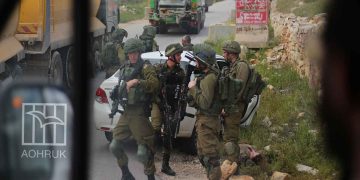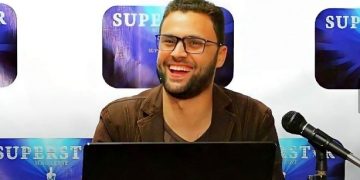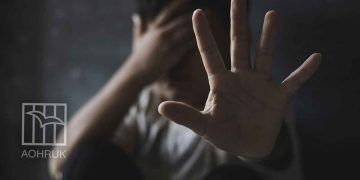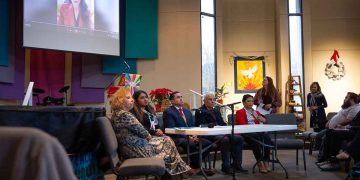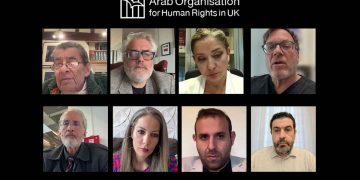Arab Organisation for Human Rights in the UK (AOHR UK) organised a webinar on Thursday evening, 6 March 2025, to address Israel’s ongoing blockade on humanitarian aid to Gaza, its violations of the ceasefire, and Prime Minister Benjamin Netanyahu’s push to resume the genocidal war. The discussion focused on Israel’s deliberate starvation policies, its continued aggression against Palestinians, and the complicity of international actors in enabling these crimes. Speakers also examined the role of Western governments, the failures of the international legal system, and the urgent need for global action to hold Israel accountable.
The webinar featured a panel of experts and activists, including, Miko Peled – Head of Palestine House of Freedom in DC, Jeff Halper – Head of the Israeli Committee Against House Demolitions (ICAHD), Professor Haim Bresheeth – Professor of Film Studies at SOAS, Alicia Koutsoulieris – Communications Director at Partners for Palestine, Booker Ngesa Omole – Kenyan Political Activist, and Dr. Ibbo Mandaza – Zimbabwean Academic, Author, and Advisory Council Member at FPRI
Miko Peled began by stating that Israel’s violation of the ceasefire was entirely predictable, as the state had always planned to break it. He emphasized that Israel has a long history of violating agreements since its very inception, making its actions unsurprising. He pointed out that the newly appointed Israeli army chief had made it clear that the genocide was not over and that the mission to kill Palestinians in Gaza was still ongoing. According to Peled, Israel’s leadership has been transparent about its intent to continue its aggression, reaffirming that the killings would not stop.
He explained that Israel needed to balance releasing some of its own hostages while also responding to the demands of its coalition and the broader Israeli public, which largely supports the continued killing of Palestinians. He stated that Israel’s leadership was managing both the pressure to secure the return of Israeli captives and the push to sustain its genocidal war against Palestinians.
He stressed that the ongoing massacres of Palestinians were preventable, yet they continued because the international community refuses to intervene. He condemned global inaction, asserting that the world has never cared about stopping Israel’s genocide and ethnic cleansing of Palestine, which has persisted for nearly a century.
Commenting on international efforts to provide aid, Peled dismissed them as designed to serve Israeli interests rather than genuinely helping Palestinians. He argued that instead of sending trucks of aid that required Israeli approval, the real solution would be to dismantle the concentration camp that is the Gaza Strip, grant Palestinians freedom of movement, and ensure their access to abundant resources just beyond the enclave. He denounced the international community’s complicity in maintaining the siege by allowing Israel to dictate the terms of relief, stating that as long as the world accepts Israel’s control over Palestinian lives, the genocide will continue.
Peled stressed that the only way to stop Israel’s atrocities was through severe international sanctions, including a total arms embargo, economic and diplomatic boycotts, and an absolute ban on Israeli participation in sports, academic, and cultural events. He stated that history has shown that negotiating with the perpetrator of genocide is futile, likening the situation to trying to negotiate with Hitler while the Holocaust was ongoing. He insisted that the apartheid state of Israel is the root cause of the suffering and must be dismantled to end the genocide.
Addressing recent remarks by Donald Trump, Peled dismissed them as meaningless theatrics that only reinforced the U.S. government’s long-standing approval of Israel’s actions. He stated that Israel never needed a green light from Trump, as the U.S. has already sanctioned the genocide. He further argued that if there was genuine interest in securing the release of hostages, Israel could have done so long ago by freeing the thousands of Palestinian prisoners it holds in brutal conditions. Instead, he noted, pressure is always placed on Palestinians rather than on the actual perpetrators of the crimes—Israel itself. Peled concluded by asserting that Israel does not want to see the hostages released, as their continued captivity serves its broader agenda of justifying its ongoing war crimes.
Jeff Halper began by building on the points raised by Miko Peled, stressing that the events unfolding in Gaza cannot be viewed in isolation. He asserted that the blockade, the hostage issue, and the ongoing genocide must be understood within the broader framework of Zionist settler colonialism. Halper emphasized that settler colonialism is not merely a slogan or an accusation but a well-documented system that follows a clear structure and logic, as seen in various historical cases such as the United States, Canada, South Africa, and Algeria. He explained that Israel has already achieved full control over historic Palestine, from the river to the sea, and is now moving toward the final phase of its settler colonial project: normalization.
He outlined three interlocking phases of Zionist settler colonialism. The first was the displacement of the Palestinian population, which has been ongoing since 1948 and continues today with the theft of land in the West Bank. The second was pacification, the suppression of Palestinian resistance through massacres, military control, and oppression. He argued that this is the stage Israel is aggressively pursuing now, as evidenced by its war on Gaza and its push to further suppress Palestinian resistance in the West Bank. He referenced Saudi Crown Prince Mohammed bin Salman’s (MBS) statements to Donald Trump, in which he allegedly demanded that Palestine be “quietized” before fully joining the Abraham Accords. Halper explained that this pacification campaign is precisely why Israel continues its aggression against Gaza and the West Bank.
The final stage is Normalization, where Israeli apartheid becomes legitimized globally, and Palestine is erased from the political agenda. This is achieved through diplomatic normalization with Arab states, renaming Palestinian territories with Hebrew names, and integrating Israel’s settler-colonial project into the international system as an irreversible reality.
Commenting on Israel’s military campaign, Halper highlighted that the forced displacement and genocide in Gaza were not random actions but inherent to the logic of Zionist settler colonialism. He noted that Netanyahu’s plan to completely eliminate the Palestinian presence in Gaza had now been echoed by Trump, but that this idea was always part of Israel’s long-term strategy. He further explained that in 1948, 85% of Palestinians in what became Israel were forcibly displaced, and today, Israel is working toward a similar goal—either through outright genocide or by confining Palestinians to enclaves that function as Bantustans under apartheid.
Halper then turned to the broader geopolitical dynamics, arguing that the so-called international community has no interest in stopping Israel. He pointed out that while many hope for support from BRICS countries, these nations have largely aligned with Israel instead of countering U.S.-Israeli domination. He cited China’s deep economic ties with Israel, including its role in building key infrastructure such as the Haifa port and the Tel Aviv subway. He also highlighted India’s ideological alignment with Zionism under Modi’s leadership. Additionally, he warned that the recent entry of Saudi Arabia, the UAE, and Egypt into BRICS signaled that Arab regimes were further entrenching themselves in pro-Israel alliances rather than standing with Palestine.
Jeff Halper also emphasized the role of Arab countries and their responsibility in the ongoing genocide. He stated that the actions of the U.S. and Israel were expected and that Trump, Netanyahu, and Western powers were simply doing what they have always done. However, he stressed that the real failure lies with the Arab governments, particularly those normalizing relations with Israel. He argued that Saudi Arabia, the UAE, Egypt, and other Arab states have played a crucial role in enabling Israel’s apartheid and genocide by aligning with the U.S.-Israeli agenda instead of resisting it.
Halper made it clear that the last phase of settler colonialism is normalization and that Arab regimes are the final piece of this puzzle. He pointed out that Saudi Arabia’s near-complete normalization with Israel would seal Palestine’s fate, making resistance even harder. He called for pressure on Arab governments to stop cooperating with Israel, arguing that this is where activists and the global community should focus their efforts instead of expecting change from Israel or the U.S., which he described as immune to pressure.
Halper concluded his speech by referring to a campaign he is involved with, the One Democratic State Campaign, which aims to launch a global movement against the normalization of Israeli apartheid. He warned that if the world fails to challenge the normalization process, Israel will have achieved its ultimate goal: the complete erasure of the Palestinian struggle.
Professor Haim Bresheeth began by commenting on Donald Trump’s recent statements, asserting that Trump is entirely unpredictable. However, he emphasized that the real danger of Trump’s interventions is not just their erratic nature but the fact that they are actively undermining international law. He argued that while international law has never been particularly strong, it is now in a state of complete collapse. Decisions made by the International Court of Justice (ICJ) and the International Criminal Court (ICC), he stated, are effectively meaningless, as Israel has no intention of complying with any rulings issued by these bodies. Professor Bresheeth stressed that international law is only effective when it is enforced through sanctions, yet Israel has never faced any sanctions despite violating international law every year since its inception in 1948. He noted that this makes Israel unique among nations, as no other country has consistently broken international law without consequences.
Drawing a comparison between the situation in Palestine and Ukraine, Professor Bresheeth highlighted the double standards of the West. He pointed out that within a week of Russia’s invasion of Ukraine, the country was placed under harsh sanctions, despite NATO’s prior provocations and its role in escalating tensions. In contrast, Israel has never faced sanctions, not even in the wake of its ongoing genocide in Gaza. He argued that with Trump—the most dangerous U.S. president—backed by Netanyahu, Israel now enjoys even greater impunity, making it even less likely that sanctions will be imposed. He warned that Netanyahu, unlike Trump, will indeed open the “gates of hell” by continuing the war, regardless of international outcry.
Professor Bresheeth then introduced the work of “Bring Gaza Home,” an organization he is involved with that is led by Palestinians and anti-Zionist Israelis. He explained that their campaign is based on UN Resolution 194 (passed in 1949), which affirms the Palestinian right of return. He noted that since 1948, Israel has refused to allow any of the 800,000 Palestinian refugees it expelled to return and continues to deny this right to their descendants. The campaign, he explained, seeks to force Israel to comply with this long-standing UN resolution. He emphasized that Palestinians from Gaza should be allowed to return to their original homes, rather than being forcibly displaced to distant countries under the guise of “humanitarian” solutions.
Outlining the conditions necessary to both end the genocide and secure Palestinian rights, Professor Bresheeth stated that the first and most urgent requirement is a protection force for Palestinians. He noted that UN rapporteurs, including Francesca Albanese, have already called for an international protection force, as it is impossible for Palestinians to survive under Israel’s current onslaught without such a mechanism. He emphasized that this force should not be led by the U.S. or Western countries but should instead consist of Arab and international forces. He pointed out that this could be achieved through a UN General Assembly vote, bypassing the Security Council, where U.S. veto power has historically shielded Israel.
Professor Bresheeth then proposed suspending Israel’s UN membership, drawing a parallel with the 1974 expulsion of apartheid South Africa from the UN General Assembly. He argued that since apartheid is a recognized crime under international law, the same legal framework that applied to South Africa should now apply to Israel. He revealed that his organization is actively working with politicians from countries such as Norway, Spain, Ireland, and EU representatives in Brussels to push for this action at the UN. He stressed that, given the General Assembly’s overwhelming opposition to Israel’s actions, such a resolution could pass if not blocked by U.S. interference.
Turning to the reconstruction of Gaza, Professor Bresheeth criticized the Arab-led initiative to collect funds for rebuilding and insisted that those responsible for Gaza’s destruction—Israel and its Western backers—must be held financially accountable. He argued that international law requires the perpetrators of war crimes to compensate their victims, meaning that the burden of reconstruction should not fall on Palestinians or neutral states but on Israel, the U.S., and European governments that supplied Israel with weapons and political support. He framed this as a legal obligation under international law, not merely a moral appeal.
Professor Bresheeth concluded with a stark warning: if the international community fails to act now, it will permanently lose all credibility when it comes to international law. He described the genocide in Gaza as a globally visible, media-documented atrocity supported by 97% of Israeli society, making it one of the most clear-cut cases of a state committing mass atrocities with popular backing. He warned that if this genocide is allowed to proceed without consequences, the very concept of international law will become meaningless. He called on activists, legal experts, and political leaders to push for concrete action—protection forces, Israel’s suspension from the UN, and financial accountability for Gaza’s destruction—stating that failing to act would amount to complicity in Israel’s crimes. “This is a test for humanity,” he concluded. “I hope humanity passes it.”
Alicia Koutsoulieris began by emphasizing that the events of October 7th did not happen in isolation but were a reaction to years of Israeli oppression. She argued that the blockade on Gaza, which has lasted 17 to 18 years, and the decades-long Israeli military occupation of the West Bank created the conditions that led to October 7th. She dismissed the idea that one needs to be a political expert to understand this reality, stating that if Palestinians had not been subjected to military rule and collective punishment for decades, October 7th would not have occurred. She pointed out that military orders in the occupied West Bank, which have been in place since 1967, are supposed to be temporary but have become a permanent tool of oppression, governing even minor aspects of Palestinian life, such as what crops they are allowed to plant.
She also emphasized that Palestinian Muslims are not the only ones facing Israeli oppression; Palestinian Christians are equally subjected to Israel’s apartheid policies. She pointed out that many of the cities frequently mentioned in Western news coverage—such as Jerusalem, Bethlehem, Nazareth, and Jericho—are central to Christian history. Yet, Palestinian Christians living there face the same military occupation, restrictions, and violence as Muslim Palestinians.
Commenting on the casualties since October 7th, Alicia stated that Israel’s bombardments overwhelmingly target civilians. Schools, hospitals, mosques, churches, and refugee camps are being attacked, resulting in upwards of 70% of those killed being women and children. She cited testimonies from doctors and nurses who have worked in Gaza, describing how children are being brought in with severe war wounds, contradicting Israel’s claim that it is only targeting Hamas. She condemned the continued flow of U.S. military aid to Israel, highlighting that even before October 7th, Israel was receiving $3.8 billion annually in military aid to enforce its blockade and occupation. Rather than holding Israel accountable for its actions, she noted, the U.S. government responded by sending even more weapons.
Alicia then turned to the growing shift in public opinion within the U.S., stating that ordinary citizens are increasingly outraged by their government’s role in enabling genocide. Thanks to social media, she explained, people no longer have to rely on the biased Western media—they can see the genocide in real-time. This has led to a surge in activism, with more Americans pressuring their elected officials to stop supporting Israel’s war crimes. She highlighted her work with various organizations in the U.S., focusing on educating the public and mobilizing grassroots pressure on Congress. She emphasized that people must demand that U.S. legislators stop providing Israel with a blank check for weapons and instead support measures that cut military aid and hold Israel accountable under international law.
Alicia concluded by warning that Israel’s genocidal policies against Palestinians predate the current war, citing reports from Amnesty International and the UN that documented Israel’s systematic deprivation of Palestinians even before October 7th. She recalled that as early as 2012, the UN warned that Gaza would be unlivable by 2020, yet the situation has only worsened. Now, in 2025, with the genocide unfolding for over 16 months, the conditions in Gaza are beyond catastrophic. She stressed that Israel’s blockade is now tightening further, cutting off food, water, and essential supplies, making immediate action even more urgent. She ended with a call for Western citizens to put direct pressure on their governments, stating that if elected officials refuse to take a stand against genocide, they should be voted out and replaced with those who will.
Booker Omole began by expressing the unwavering solidarity of the Kenyan-Palestinian movement, the Solidarity Committee, and the Communist Party with the Palestinian people. He firmly stated that there is no way to defeat settler colonialism except through resistance, drawing historical parallels to North America and Australia, where settler colonialists sought not partial domination but total annihilation of the indigenous population. He argued that the ongoing land theft in Palestine, the collective punishment imposed by the Zionist regime, and the continuous killings are deliberate tactics to break the Palestinian spirit. The only way to neutralize Zionist domination, he insisted, is through continued resistance rather than negotiations, which have only served to weaken Palestinian resistance and further entrench Israeli control.
Omole dismissed Israel’s ceasefire agreements as nothing more than strategic maneuvers aimed at serving Zionist interests rather than bringing peace. He pointed to Netanyahu’s political troubles at home, emphasizing that the temporary pause in Israel’s war was merely a tactic to ease domestic pressure regarding the hostages while allowing Israel to advance its war objectives under the guise of a ceasefire. He insisted that the genocide in Gaza continues, despite attempts to frame ceasefires as steps toward resolution.
Commenting on Donald Trump’s return to power, Omole described him as “a strange human being” whose policies are disconnected from reality. He referenced Trump’s failed “Deal of the Century” and warned that Trump’s renewed pressure to dominate Palestinians would also fail. He argued that Trump, like other imperialists, fails to learn from history, highlighting how apartheid in South Africa was not defeated through negotiations but through armed resistance and popular struggle. He recalled how Henry Kissinger once attempted to convince African leaders that apartheid in South Africa was undefeatable, yet history proved otherwise. In the same way, no amount of military superiority can break a people determined to fight for their sovereignty and self-determination, he asserted.
Omole also addressed the propaganda tactics of settler colonialism, explaining that colonial powers always attempt to reverse the narrative by portraying the victim as the aggressor and the land thief as the oppressed. He described Israel’s claim to self-defense as a farce, stating that the Zionist entity manipulates media narratives to justify war crimes, massacres, and land grabs. He strongly rejected the illusion of international law, arguing that as long as U.S. imperialism dominates, there is no real international law—only the hegemony of the United States. He pointed to Washington’s repeated use of its UN Security Council veto to block resolutions in support of Palestine, as well as its complicity in protecting Israeli war criminals from accountability at the ICJ and ICC. He stated that the U.S. was instrumental in supporting South African apartheid and is now playing the same role in defending Israel’s apartheid regime.
He warned that relying on the international community to act would be equivalent to surrendering Palestine to Zionist control. Instead, he argued that the most effective way forward is to hold national governments accountable and expand the Boycott, Divestment, and Sanctions (BDS) movement. He called for economic and military disruptions targeting Israel’s war economy, emphasizing that as long as the U.S. continues to funnel military aid into Israel, the genocide will persist. Omole declared that the fight for Palestinian self-determination is inherently a fight against U.S. imperialism, adding that he believes the defeat of U.S. imperialism will begin in Gaza if global anti-imperialist forces unite in solidarity with the Palestinian struggle.
Omole also highlighted Israel’s past attempts to manipulate Africa by falsely portraying the Palestinian struggle as a religious conflict. He noted that Israel sought to divide African Christians and Muslims to maintain Zionist control, but this strategy has failed since 2010. He described how, today, both Christians and Muslims march together across Africa in defense of Palestine, marking a shift in global solidarity. He stated that the ongoing genocide in Gaza has not only disrupted Israel’s normalization agenda but has also strengthened and united international support for Palestine. He concluded by affirming that millions of people across Africa now stand in unwavering solidarity with Palestine, vowing that Palestinians will never again be humiliated in the way Africans suffered under settler colonialism.
Dr. Ibbo Mandaza began his remarks by expressing deep shock and disbelief at the ongoing Israeli blockade on Gaza, describing it as a deliberate act of inducing hardship, starvation, and suffering upon an already desperate population. He condemned the forced starvation imposed on Palestinians, emphasizing that this is happening in full view of the world, yet those who sponsor Israel remain silent. He particularly criticized the United States for its complete lack of response, stating that it is appalling that Washington has failed to even comment on this act of brutality. He reiterated his astonishment that, despite the level of destruction and suffering in Gaza, Israel is not only maintaining the blockade but also threatening yet another invasion, questioning what is left to destroy beyond the lives of desperate human beings struggling to survive.
Dr. Mandaza then called for a higher level of international intervention, stressing that mere resolutions and appeals are no longer sufficient. He urged the UN and all other international organizations to act with urgency and to make it clear that Israel’s continued actions in Gaza are worsening an already catastrophic situation. He described Israel’s ongoing aggression as “adding salt to the wound”, intensifying the suffering of Palestinians rather than working toward any form of resolution. He emphasized that the international community must stop merely condemning Israel in words and instead take concrete action to hold it accountable.
Turning his attention to the role of international organizations and regional bodies, Dr. Mandaza questioned whether any concrete steps had been taken to escalate this matter at the UN and other global platforms. He also pointed to the recent meeting of the Arab League in Cairo, acknowledging their recommendations, but questioned their lack of an immediate and forceful response to Israel’s current actions. He emphasized that the Arab League has direct links to the U.S. administration and should be using its influence to pressure Washington into restraining Netanyahu’s government.
Dr. Mandaza concluded by criticizing Donald Trump’s cynical and self-serving approach to Gaza, describing his proposal to turn the devastated enclave into a real estate project as obscene and detached from reality. He argued that Trump sees solutions only through the lens of his business interests, disregarding the human catastrophe unfolding before the world’s eyes. He reiterated his call for the Arab League and other influential regional actors to take stronger action, urging them to exert pressure on the U.S. to, in turn, pressure Netanyahu and his government to stop their crimes against the Palestinian people. He ended with an appeal for urgent and coordinated efforts to push this issue to the forefront of the international agenda, warning that inaction would only enable further atrocities against Palestinians in Gaza.


